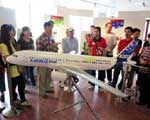Lenovo boosts app development
By Wang Xing (China Daily)
2010-11-13 09
|
|
BEIJING - Lenovo Group, China's biggest computer maker, announced on Friday that it has set up a 100 million yuan ($150 million) investment fund to support Chinese developers creating mobile Internet applications and services, as part of its efforts to expand its online application store to compete with rivals such as Apple Inc.
The new fund, which will be run by Legend Holdings Ltd, Lenovo's parent company, will focus on investing in promising Chinese application development teams and enterprises.
| |||||||
"A vital part of our mobile Internet strategy is to provide various online applications," said Yang Yuanqing, chief executive officer of Lenovo.
He said the country's smartphone market will expand rapidly in the next few years. Currently the market penetration of handsets having fast Internet connection is only about 10 percent in China, compared with about 40 percent in the United States.
Lenovo launched a new Android-based smartphone - called LePhone - in May, as part of an initiative to establish a new growth engine after its traditional computer business was affected by growing sales of smartphones, netbooks and tablet computers.
Yang said on Thursday that the company has sold more than 15,000 LePhones since its launch. He expected mobile Internet products to account for 10 to 20 percent of Lenovo's revenue in the next five years.
Analysts said that the lack of applications and services for its handset is one of the biggest challenges facing Lenovo in its bid to compete with products such as Apple's iPhone and HTC's Android-based smartphones, which have been well received by Chinese consumers.
According to Lenovo, the company's online application store has about 1,000 applications available for download at present. The number of applications on Apple's App Store has surpassed 300,000 and Android Market has more than 160,000.
Lenovo said on Friday that its applications will also work with its newly developed tablet - LePad - which will be launched in China early next year.











